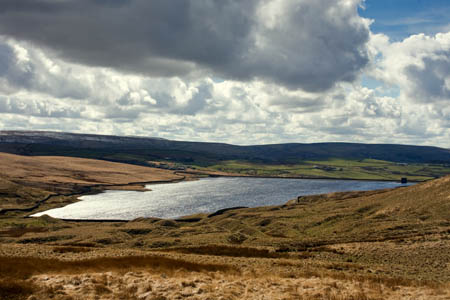
Cant Clough Reservoir, near Burnley, site of footpath improvements
The wild landscape that inspired the Bronte sisters, poet Ted Hughes and sculptor Henry Moore has received a £1.9m boost towards helping access, restoration and heritage projects.
The South Pennines, which are sandwiched between the Peak District and Yorkshire Dales national parks, consist of a broad expanse of upland moors and peat watershed on the doorstep of many northern industrial towns and cities.
The cash, from the Heritage Lottery Fund, will be used to improve paths on Ilkley Moor, at Scammonden and Cant Clough reservoirs and in the upper Colne valley. A conservation project to save the twite – dubbed the Pennine finch – will also receive money from the fund. Bronze Age cup-and-ring stones on Rombalds Moor will be mapped and interpreted, and drystone walls, sheepfolds and shooting lodges will be restored.
Regeneration company Pennine Prospects will co-ordinate the project.
Fiona Spiers, head of the Heritage Lottery Fund for the Yorkshire and the Humber region, said: “We are extremely lucky to have this beautiful countryside on our doorstep. People love this area and have been enthralled by it for centuries.
“Its restoration, which will now be made possible by the hard work of Pennine Prospects and the partnership funding they have generated, will see that history come to life. We are thrilled to be able to play a part in sustaining this valuable part of the region’s heritage.”
More than a million people live in and around the South Pennines area.
Pam Warhurst, chair of Pennine Prospects, said: “This is great news for the South Pennines; alongside our successful South Pennines Leader Programme, Pennine Prospects working with its partners has secured over £4.5m for heritage, environmental and access projects in the area.”
Six artists and writers will also be commissioned to work with residents and visitors on new writing and visual arts and archaeology and geology workshops will be run, open to residents and visitors.
Much of the moorland is designated a special protection area to protect the internationally important upland birds breeding there including merlin, peregrine falcon, short-eared owl, golden plover, curlew, lapwing, dunlin, snipe, redshank, skylark and twite.
ChrisJB
29 March 2010This is good news indeed. The poor ol' South Pennines often seems to be seen as a poorer neighbour of the Peak District and the Dales by some. Lets hope we get no more silly windmills wrecking these precious uplands as well then there will be an even greater cause to celebrate.